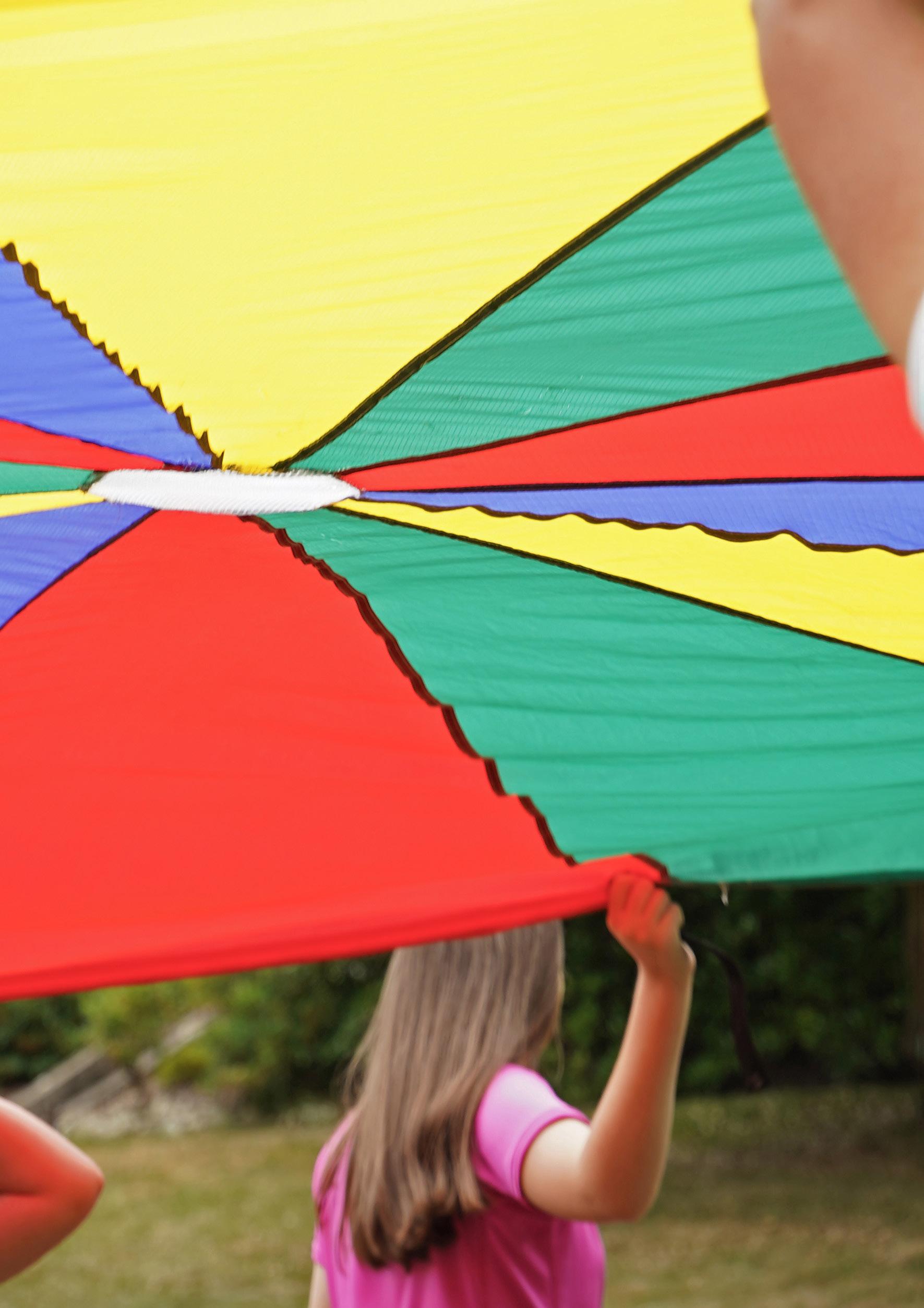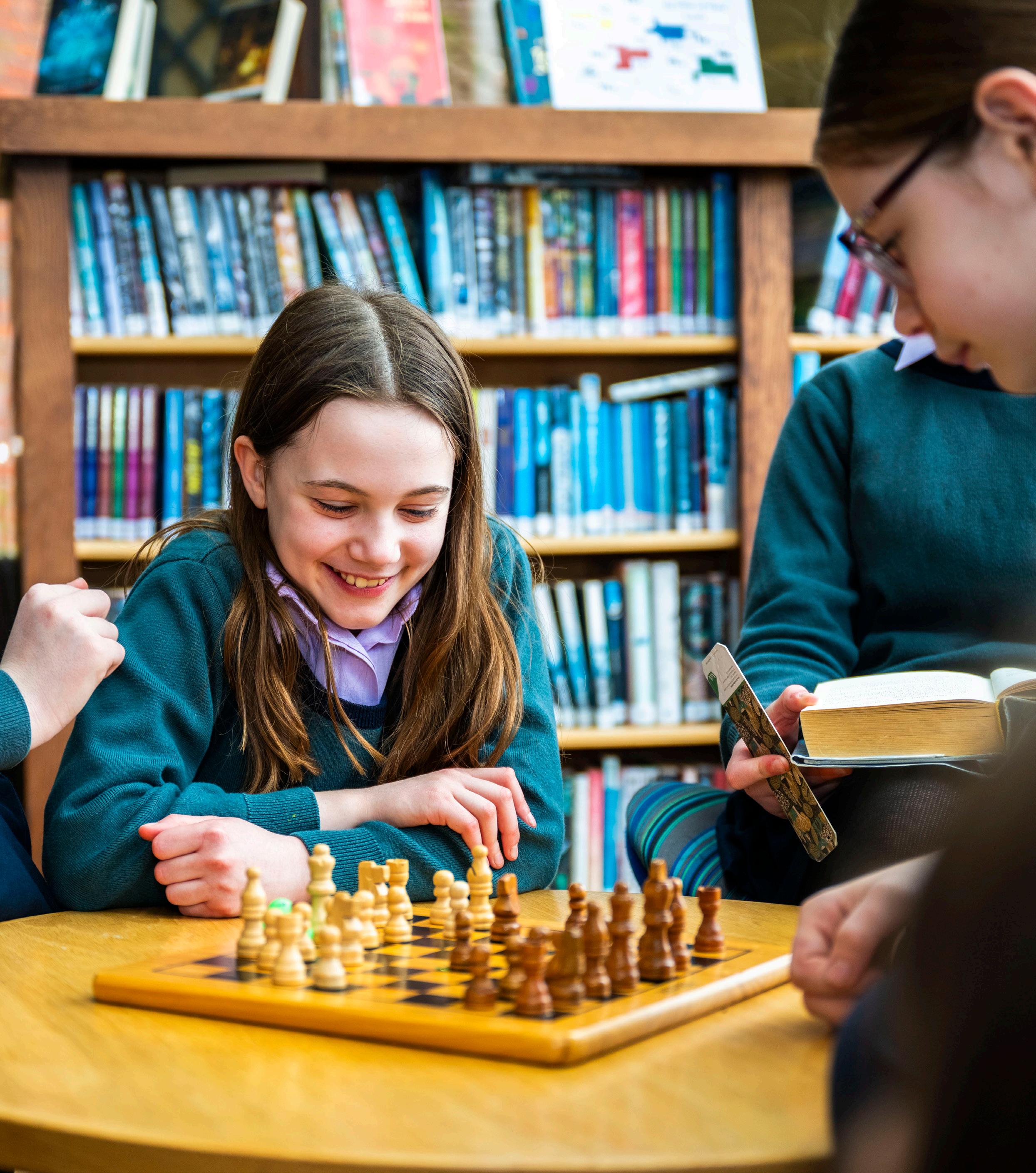

be you
WH LEHEARTEDLY
core curriculum
Farnborough Hill is committed to academic excellence; this means preparing our pupils for success within school and establishing the habits of study to succeed at university and in their subsequent careers.
Year 9 will be an exciting time for our pupils! For the first time, they have an element of choice in their curriculum, alongside developing their learning in the core subjects they have studied during Years 7 and 8. The aim is to ensure a balanced, broad and appealing offering in preparation for making final GCSE subject choices during Year 9. In the course of next year, pupils will be both following foundation pathways to prepare key skills and content ahead of their GCSE studies plus, in certain subjects, beginning their GCSE courses.
Our aim for Year 9 is that the girls will study a good range of subjects whilst also building on their particular academic strengths and interests. Underpinning their studies, we will be encouraging habits of good learning such as organisation, intellectual risk-taking, resilience, resourcefulness, reflection and inquiry. These habits are central to success both inside the classroom and beyond, promoting deep learning and higher-level academic thinking, but they also develop lifelong learning skills. They support the school’s vision of ensuring academic excellence and a future-focused approach.
Core Subjects
All pupils study the compulsory core subjects which include the following:
• English Language and English Literature
• Mathematics
• Religious Studies
• A Language: French, German, Latin or Spanish *
• Sciences: Biology, Chemistry and Physics
• Physical Education
In addition, all pupils will follow a comprehensive PSHEE programme that includes Careers Education.
* Pupils will continue one of the languages previously studied in Year 8.
Option Subjects
Pupils choose four subjects from the following choices:
• Classics: Classical Civilisation Latin
• Computing: Computer Science and Software Skills
• Design, Art and Technology (DART): Art and Design and / or Design and Technology: Food Preparation and Nutrition and / or Design and Technology: Product Design
• Drama
• Geography
• History
• Modern Foreign Language (a second language: French, German or Spanish)
• Music
• Physical Education: Health and Fitness
We encourage our pupils to keep their options as open as possible at this stage. It would be helpful to bear in mind that subjects that are discontinued in Year 9 cannot be picked up again for study in Year 10, as too much content and skillsdevelopment will have been missed.
During the Spring Term, Year 8 pupils will receive a great deal of help and guidance to help them to make the best choices for themselves and to move confidently into Year 9. Please do ask if you need any additional guidance.
At the beginning of the options process, all pupils have a free choice. Once their options are chosen and submitted, our timetabling team will create ‘option blocks’ based on these selections and we will do our best to accommodate all requests: any problems encountered will be carefully talked through with the girls. Any later requests for changes will be dependent on numbers in the option blocks created. Please note that in the event of a very low uptake for a subject in Year 9 (ie less than four pupils opting for that subject) then the subject will not run. It is important that pupils consider their reserve option carefully, just in case it is needed.
We wish you every success with this exciting next step of the journey!
Mrs Maria Young, Headmistress

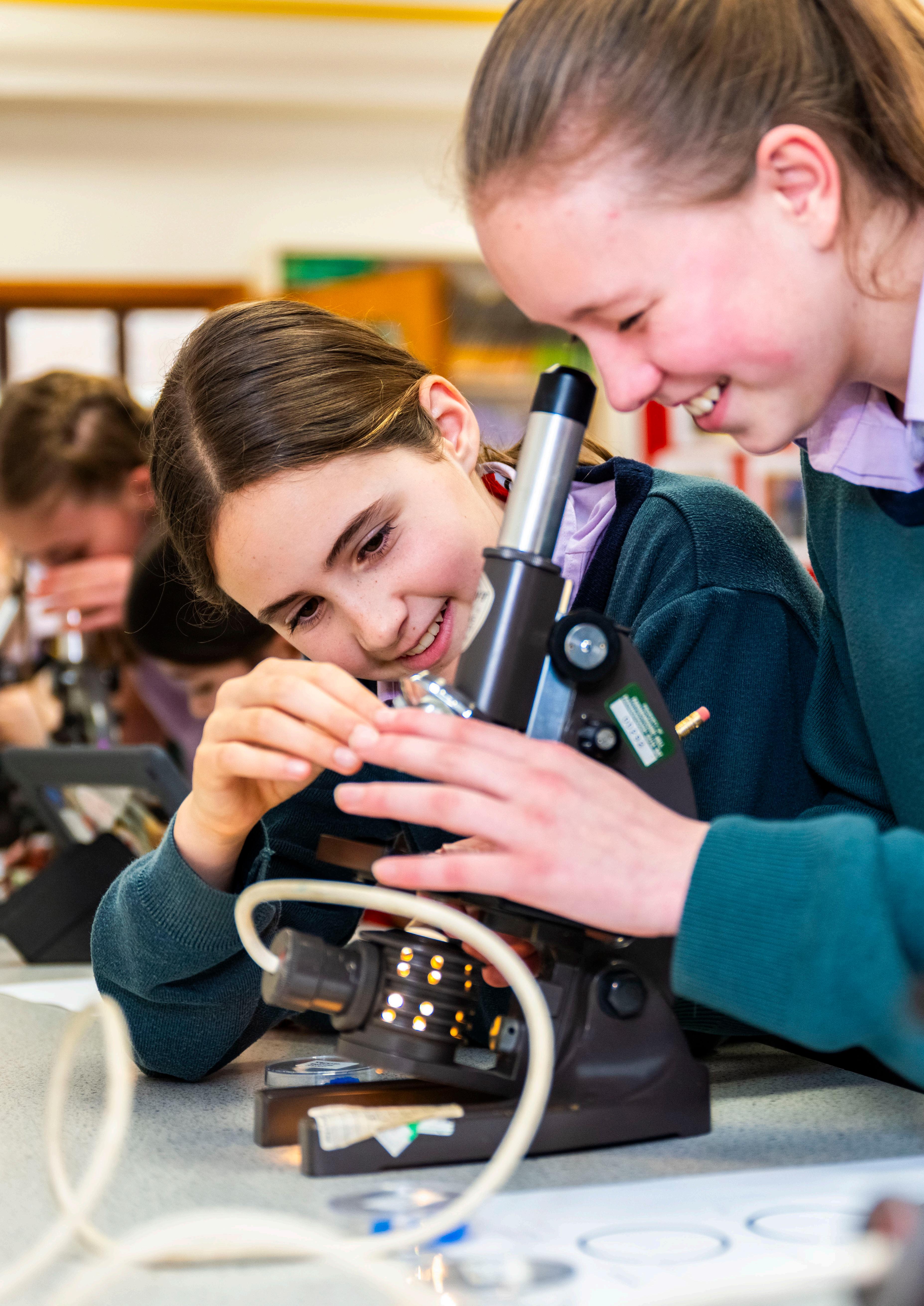
KEY DATES:
• Year 9 Options EveningTuesday 21 January 2025
• TOOLS Options programme information sent outWednesday 22 January 2025
• Submit Options choices - by Monday 24 February 2025
CREATIVE arts
ART AND DESIGN
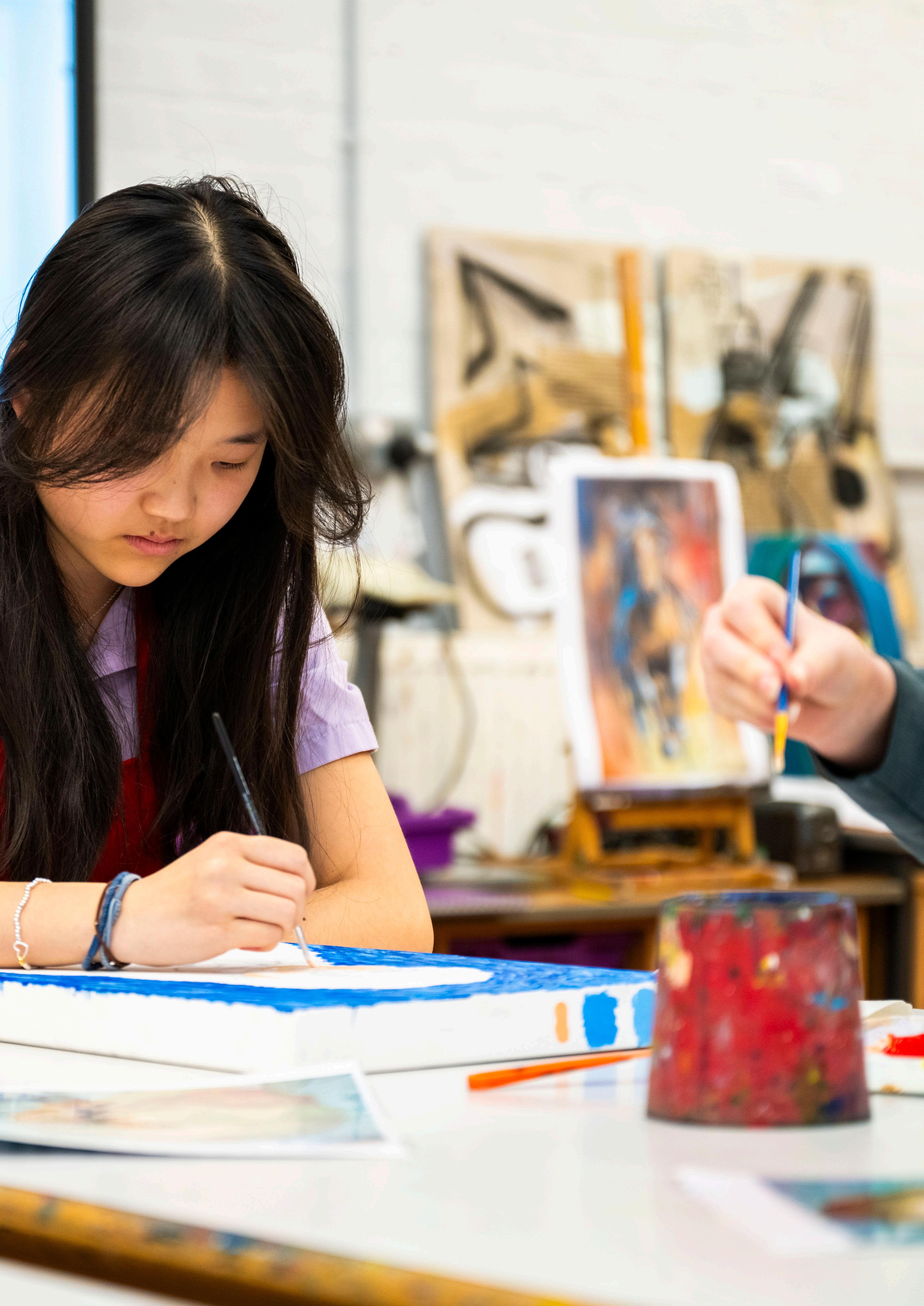
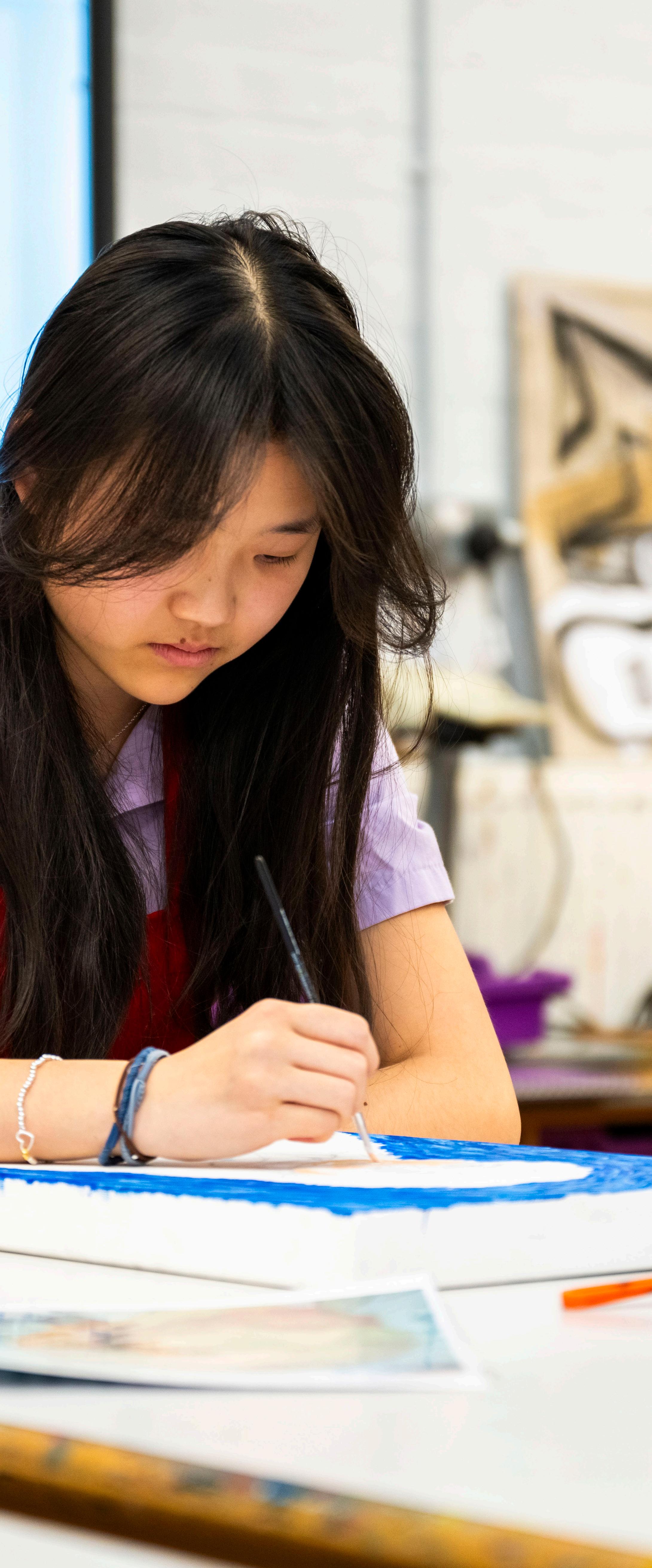
In Year 9, preparation for the GCSE begins with an initial foundation course, where the basic skills for the range of disciplines taught are explored in more detail. Girls will learn how to respond to a title and develop their skills in all areas to make independent responses to set topics, such as ‘Surfaces’ or ‘Contrast’. They will have the opportunity to visit an art gallery and build their contextual understanding of Art.
It is important for pupils to be able to record ideas and communicate them to others through a variety of different media. We offer an enriching selection of disciplines, led by subject-specific teachers. Drawing and Painting are an integral aspect of the course; however, pupils will also study Ceramics and Textiles, including Mixed Media.
In the first two terms the pupils will study Drawing and Painting as well as Ceramics and Textiles. In the third term the pupils can choose one area of focus from the three options: Drawing and Painting, Ceramics, and Mixed Media including Textiles.
This programme of study provides an excellent foundation for the girls to decide upon the areas that they want to develop further in Year 10, if they choose to continue.
Foundation Course
Terms 1 and 2
Drawing and Painting, Ceramics, Textiles including Mixed Media
GCSE
Term 3
Select two areas of focus from:
Drawing and Painting, Ceramics, and Mixed Media including Textiles
Assessment
Coursework makes up a substantial part of the GCSE course and the girls are required to demonstrate their ability to:
• Research artists and use art terminology
• Record their observations through visual and other means
• Select appropriate media and techniques by experimenting with a range of materials
• Present a personal outcome Assessment is continuous throughout the course.
Additional Information
Studies will be enriched by visits to art galleries where the techniques and approaches of artists will be investigated.

DESIGN AND TECHNOLOGY:
FOOD PREPARATION AND NUTRITION
Challenge the brain as well as your taste buds! Food Preparation and Nutrition in Year 9 will prepare pupils for the challenges at GCSE. This exciting course focuses on developing high-level practical techniques to ensure that pupils have an understanding of why we cook food, cooking methods and how these methods affect the nutritional properties and palatability of food, functions of ingredients and food safety. These skills will prepare the girls for living in a contemporary, changing and multicultural society. The course places an emphasis on the choice and management of resources and will give them the confidence to make justified decisions to meet individual dietary needs.
Course modules include:
• Food Defence
• The Food Doctor
• The Food Lab
There will be a large practical content in this course. Pupils will be expected to plan, prepare and present a range of dishes suitable for various occasions and special diets. In addition, there will be an element of experimental work to investigate the functional and chemical properties of food. They will be expected to provide their own ingredients for dishes that will be taken home.
Assessment
Practical and written assessments will be ongoing throughout the course. They will include short factbased tests, multiple choice questions, recipe adaptation, nutritional analysis, practical investigations and demonstration of practical excellence.
Additional Information
Chefs and representatives from the food industry will be invited in to share their expertise and experience.
Possible trips:
• Butchery – demonstrations and information on locally sourced produce / organic foods.
• Gordon Ramsay School of Cookery
• BBC Good Food Exhibition
DESIGN AND TECHNOLOGY:
PRODUCT DESIGN
This creative course, which covers every area of Design and Technology, will give pupils an insight into the world of design and technology in modern society. They will analyse product designs of the past and learn how they influence our future. The girls will use creative design skills to solve real-world problems and develop high quality products. The course will equip them with the skills and knowledge of working with a range of different materials, machines and equipment required for this GCSE. They will develop their computer drawing skills and learn how to use CAD/ CAM to design and manufacture a variety of products such as packaged pizza cutters, passive amps and an upcycling project. Drawing skills are a key element of the course, as well as studying the work of designers – both historical and contemporary.
The project-based approach offers real scope to those with enquiring and inventive minds. Pupils will design and manufacture using the three main resistant materials – wood, plastics, paper and board but also learn about metals, textiles and electronic systems.
Assessment
Design folder and practical work will be ongoing throughout the course and will follow the format of the AQA specification. Pupils will take short fact-based tests and complete elements of design folders, as well as make products.
Additional Information
Pupils in Year 9 are encouraged to enter local and national design competitions, such as the Starpack Packaging Competition, Design Ventura and the Teentech Awards.
Pupils in Years 10 and 11 will take part in a number of trips such as to the Design Museum and New Designers in London. There is also the opportunity for Year 11 pupils to apply for a prestigious Arkwright Engineering Scholarship.
humanities
CLASSICS:
CLASSICAL CIVILISATION
The Year 9 Classical Civilisation curriculum covers Homer’s great epic poem, The Iliad, in detail. We approach this through the superb War with Troy recordings and learn about the mythological context (gods and goddesses) in which the poem was composed. This is excellent preparation for studying ancient texts in the GCSE course.
The girls will also study Roman life through the lens of Pompeii, following the OCR format. They will look at gods, religion, entertainment (theatre, gladiators, chariot racing) and housing. This is all excellent preparation for the GCSE course. It is also directly relevant to our study tours to Italy and Greece.
(Details of the War with Troy project can be found at: http://classictales.educ.cam.ac.uk/ stories/warwithtroy)
Assessment
The course content is continually assessed through short fact-based tests, project work, and presentations. In addition to the November and Summer Assessments, pupils are also given end of topic assessments to regularly check their understanding.
CLASSICS:
LATIN
The Year 9 Latin curriculum continues to balance linguistic and non-linguistic study. We use the Cambridge Latin Course which moves to Roman Egypt and then back to Roman Britain. The classical civilisation background is a strong feature of the course and project work will include looking at the Seven Wonders of the World, Roman Medicine and Roman Religion.
We also begin the GCSE course in earnest by reading more advanced material from the specification.
By the end of Year 9, the girls will have reached stage 22 of the Cambridge Latin Course and will have covered a good deal of the grammar and vocabulary required for GCSE Latin. At GCSE there is a defined vocabulary list for the language paper and pupils will have learnt many of these words by the end of Year 9, putting them in an excellent position to go forward to GCSE.
Assessment
The course content is continually assessed through short fact-based tests and project work, as well as routine prep tasks. We make full use of technology to support the learning of both Latin and the cultural and historical background of topics eg using Google Earth to visit ancient sites.
Additional Information
In the Classics Department, we believe there is no substitute for seeing and experiencing the Ancient World for real and so we offer trips both in the UK (Roman Bath) and abroad. These trips complement, and are often of direct relevance to, the topics studied in these courses. It is always wonderful to see the girls at GCSE and A level drawing upon their experience of visiting these sites in the public examinations.
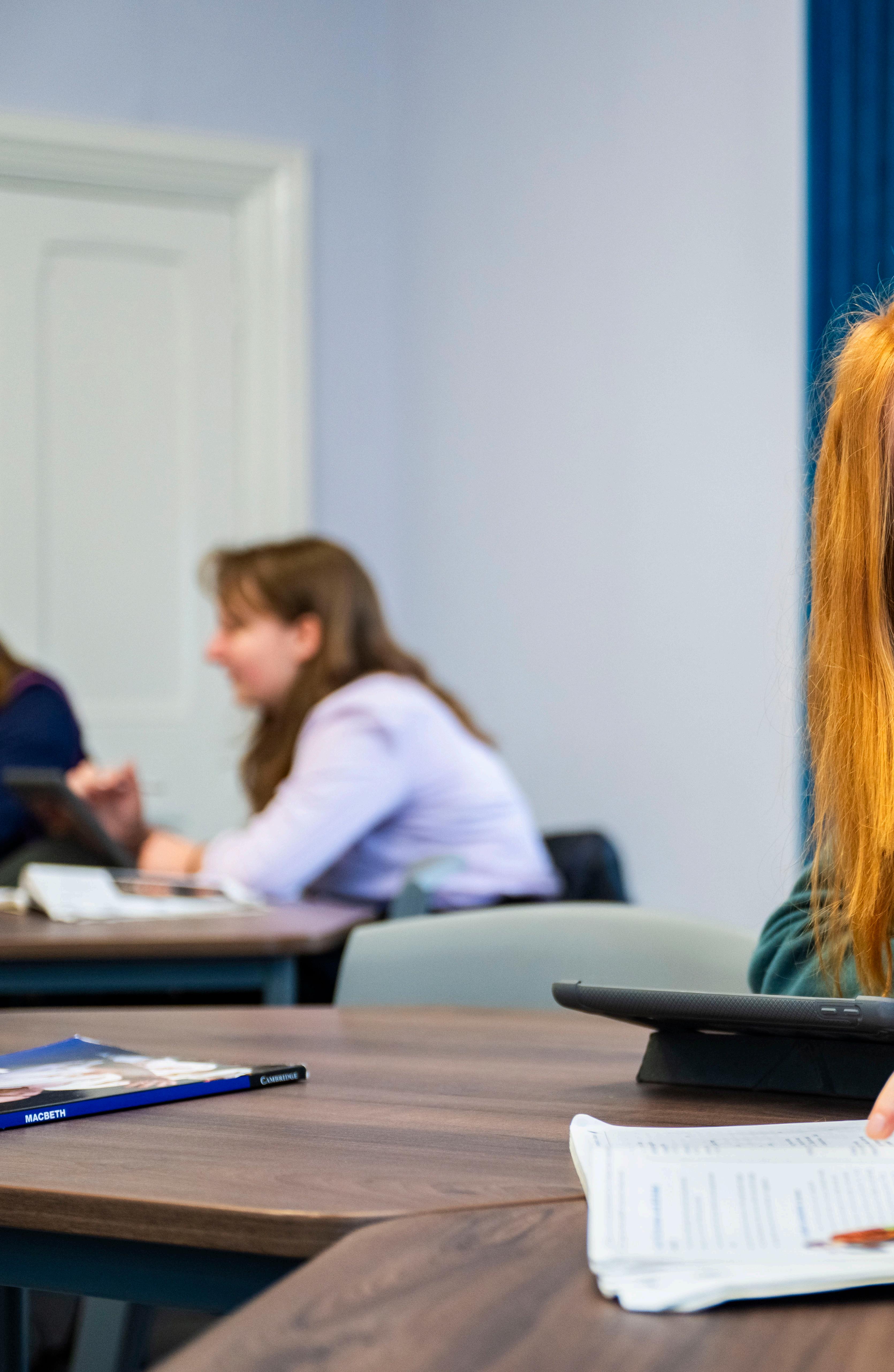
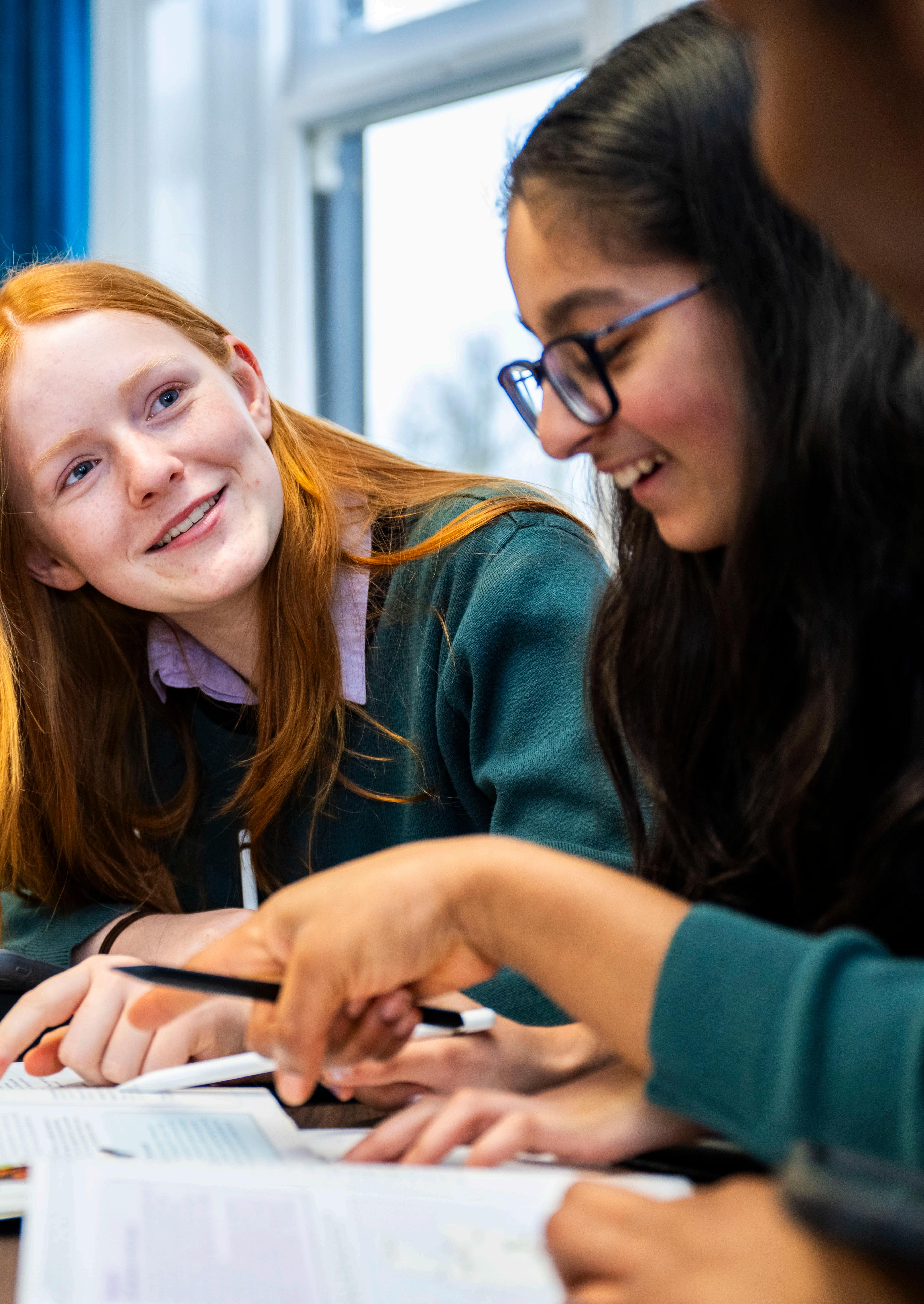
humanities
GEOGRAPHY
The Geography course provides pupils with the opportunity to question why people continue to live in tectonically active regions. They will discuss the issues facing our cities as urban populations grow exponentially and debate how our future might be shaped by climate change and explore our role in assuring a sustainable future for us all. Through these topics the girls will engage with the current debates of our world leaders and have opportunities to express their own viewpoints on these key matters. These topics form part of the AQA GCSE specification studied at Farnborough Hill.
Assessment
Assessments will follow the GCSE format and are carried out in November, March and June. These assessments include short knowledge-based questions, skills-based questions and longer evaluative questions. Technology is frequently used to support learning activities eg using Google Earth for virtual field trips or iPads to create stop motion videos.
Additional Information
Year 9 geographers visit the Natural History and Science Museums to support learning of natural hazards and climate change.
Every two years we run an ‘Awe and Wonder’ trip for Year 9 and above. Previous groups have travelled to China, Iceland and, most recently, the Azores. These trips complement the course content from Year 9, GCSE and A level and are always enjoyed by all.
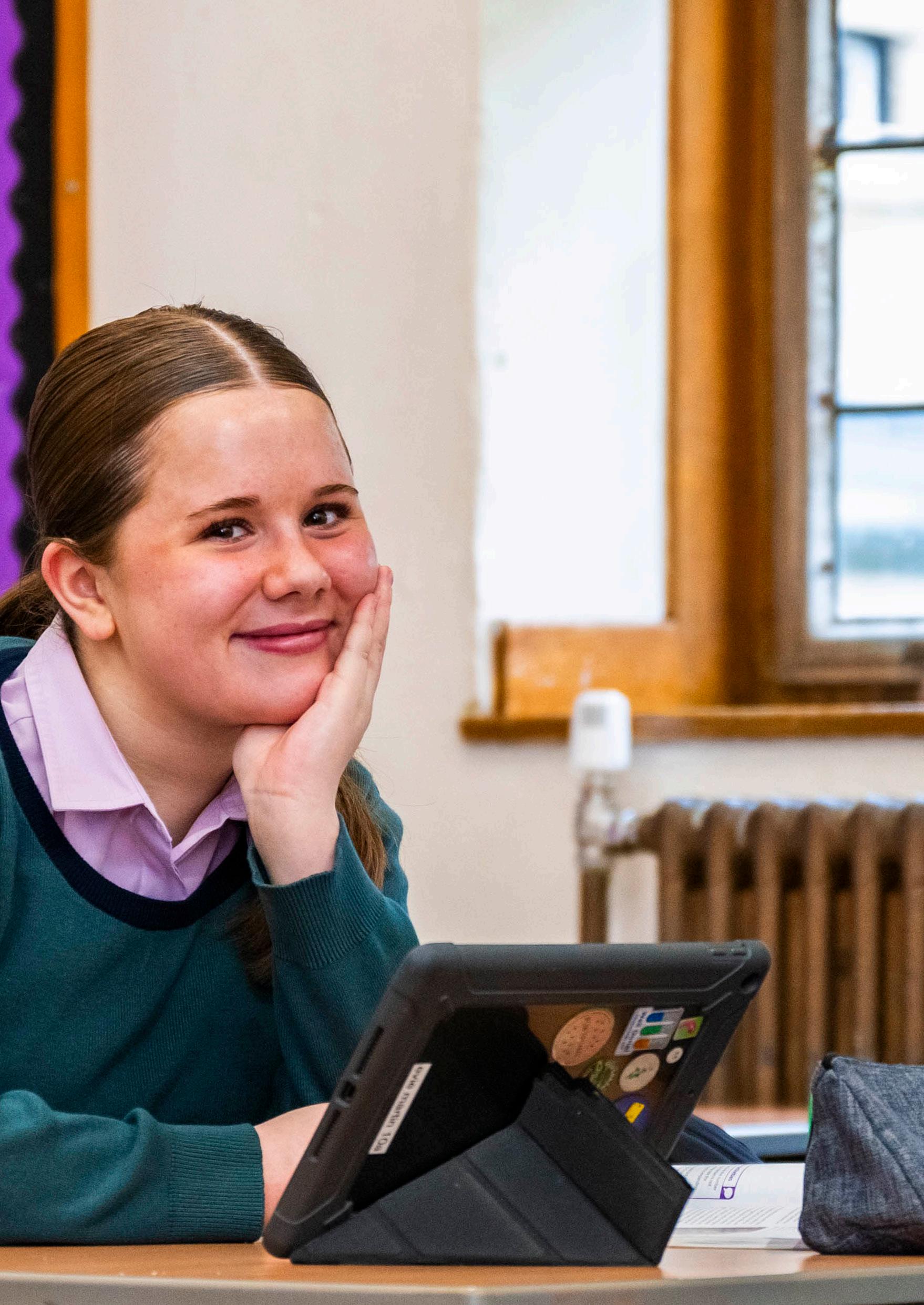
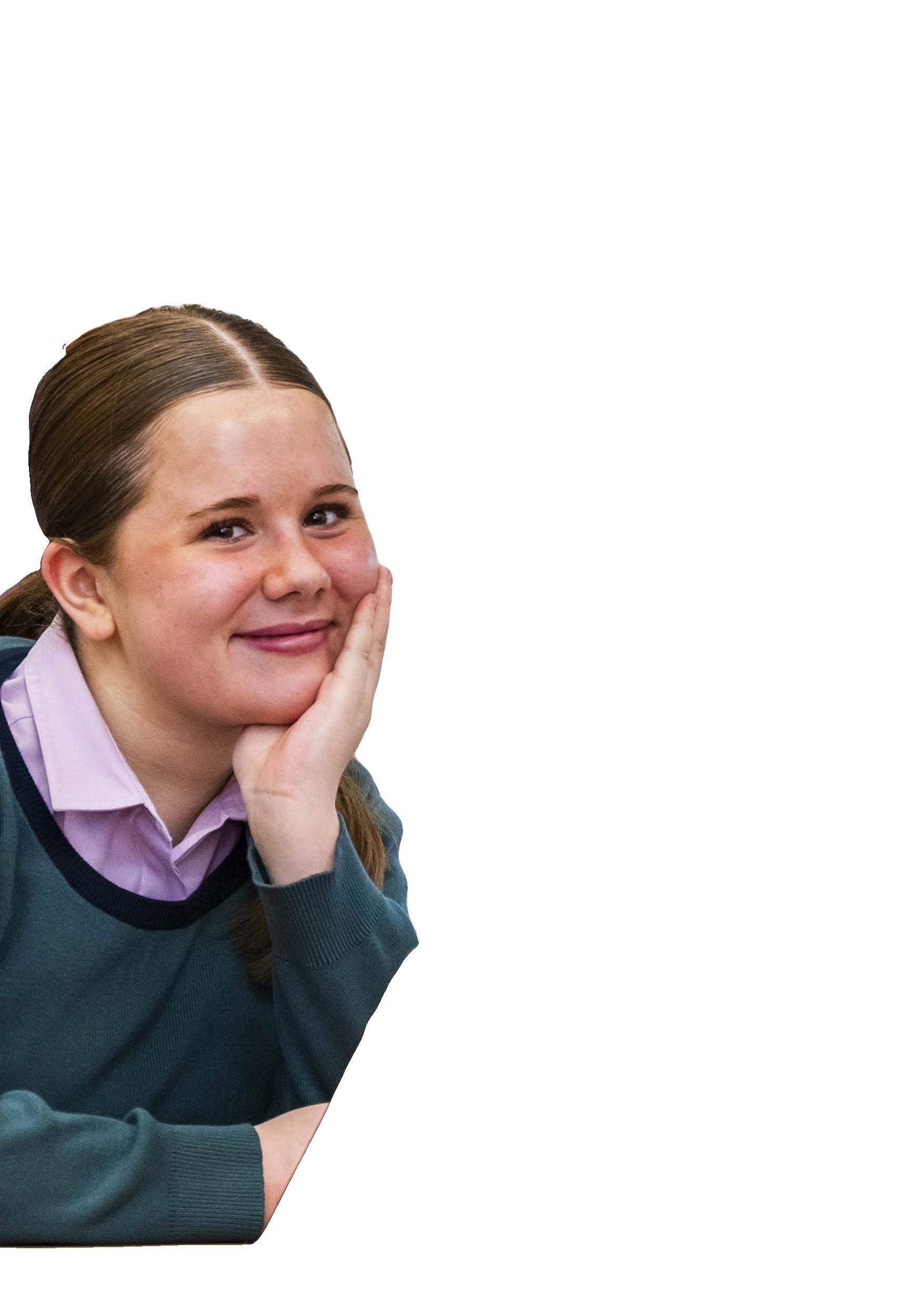
HISTORY
We begin Year 9 with an exploration of some of the most formative events of the 20th Century. This means we continue a largely chronological approach, picking up where Year 8 leaves off. We look at the reasons behind the 1917 Revolution in Russia, including an exciting history mystery about the fate of the Romanovs. Our big focus is then on examining the ideas of Marx and comparing them to how Communism played out in Russia in the 1920s and 1930s. This means the pupils can come to their own conclusion about whether or not Stalin really created a socialist utopia for the Russian people.
We then look in detail at the development of antiSemitism in Europe and Germany, culminating in a study of the causes, experiences and consequences of the Holocaust.
This puts us in an excellent position to introduce the IGCSE course in the second term of Year 9. We begin with Paper 1 of the Edexcel IGCSE, which is an examination of the causes, events and significance of the Civil Rights movement in the 1950s and 1960s, using those same skills developed in the first term. During this part of the course we look at how the Civil Rights movement exploded in the 1950s and 1960s and how key individuals like Martin Luther King and Malcolm X helped to shape events. This course gives us the opportunity to explore important concepts such as prejudice and civil disobedience, and to put ourselves in the shoes of people fighting for justice and equality, asking ourselves whether we would do what is right in the face of dangerous opposition.
Assessment
By the end of Year 9, pupils will have become confident with four of the nine IGCSE question styles putting them in an excellent position to go forward with IGCSE History. Pupils are continually assessed throughout the year, practicing the IGCSE questions in November and June.
Additional Information
By the end of Year 9, pupils will have completed approximately 20% of the IGCSE course. We will be visiting Washington DC in the Easter of 2026 to support the IGCSE Civil Rights course. We will then be looking to visit Berlin in the Easter of 2028 to explore sites we will be learning about in the Superpowers course.
MODERN FOREIGN LANGUAGE: FRENCH, GERMAN OR SPANISH
Pupils may take a second Language as one of their option subjects. This must be a language previously studied. Pupils are not able to take up a Modern Foreign Language from scratch in Year 9.
Pupils continue to build their knowledge of key grammar and vocabulary and cover a range of topics including school, holidays and free time. They will also develop the key skills needed for further study of a language.
Listening: They will practise learning how to predict what they are about to hear, as well as how to take effective notes whilst listening to extracts in another language.
Reading: Working with more authentic sources and a variety of resources, pupils will read extracts to develop their vocabulary and to practise translation skills.
Speaking: They will continue to develop GCSE style spontaneity by doing role plays, describing a photo and building up responses so that they can have a conversation based on a range of topics.
Writing: Pupils will be practising translation skills and developing a bank of structures and core language so that they can start to manipulate the language and then be able to write more confidently.
Assessment
Assessments throughout the year will include vocabulary, listening, reading, speaking and writing. Our aim is for pupils to be able to demonstrate general and specific understanding of the spoken and written language, to develop their use of vocabulary and to be more confident when asked to use the language spontaneously.
Additional Information
Pupils will be able to participate in trips to France, Germany and Spain.
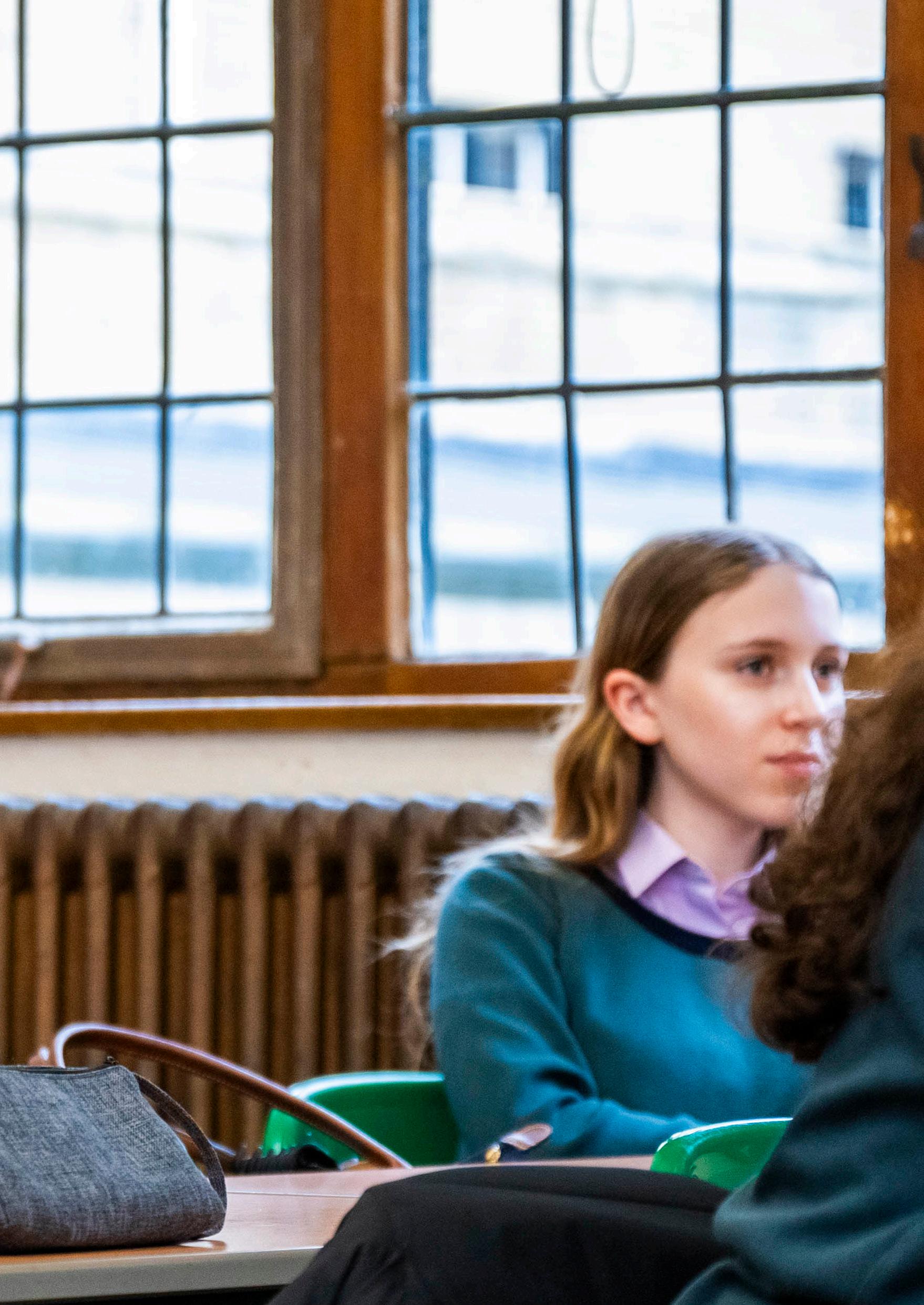

PERFORMING ARTS
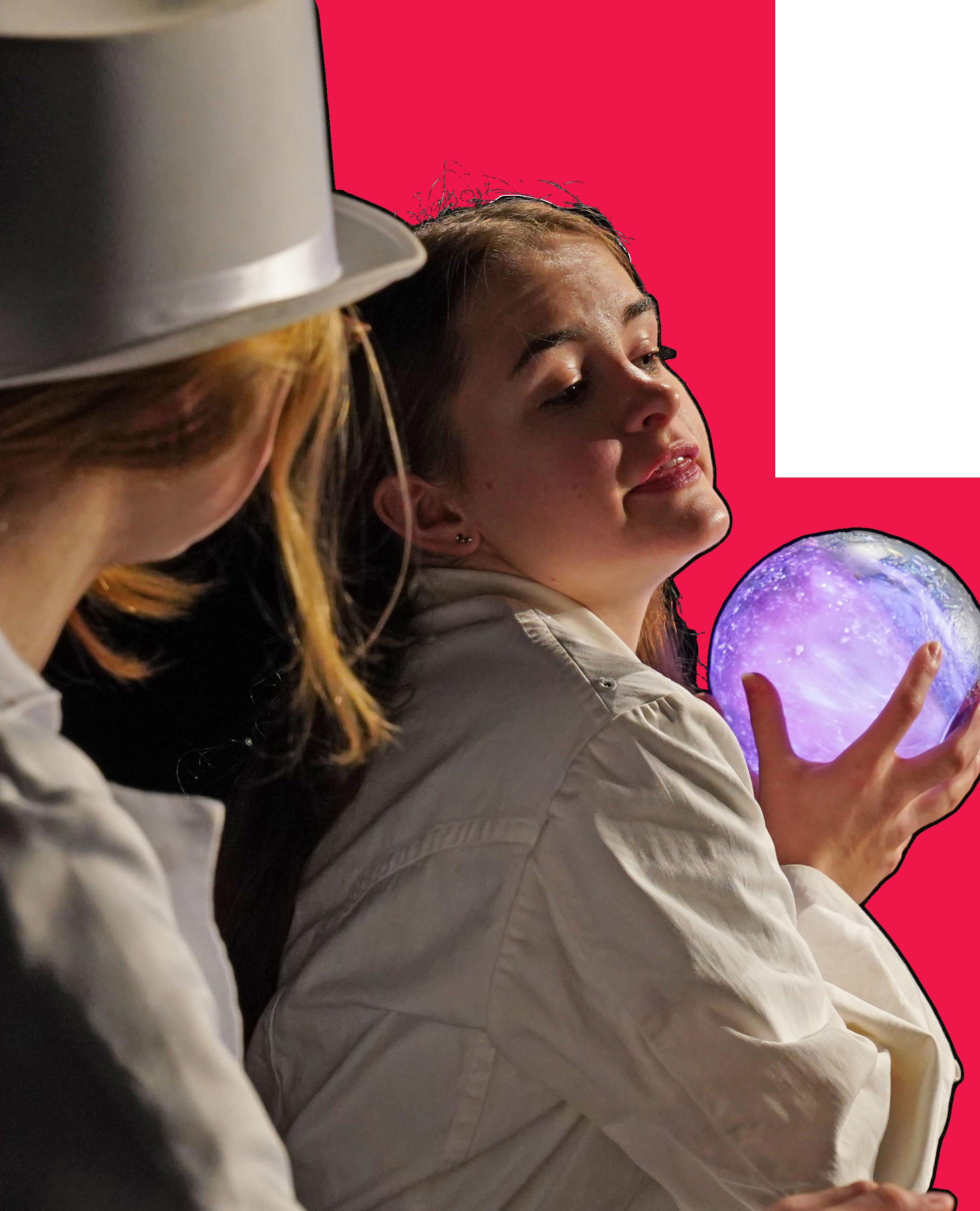
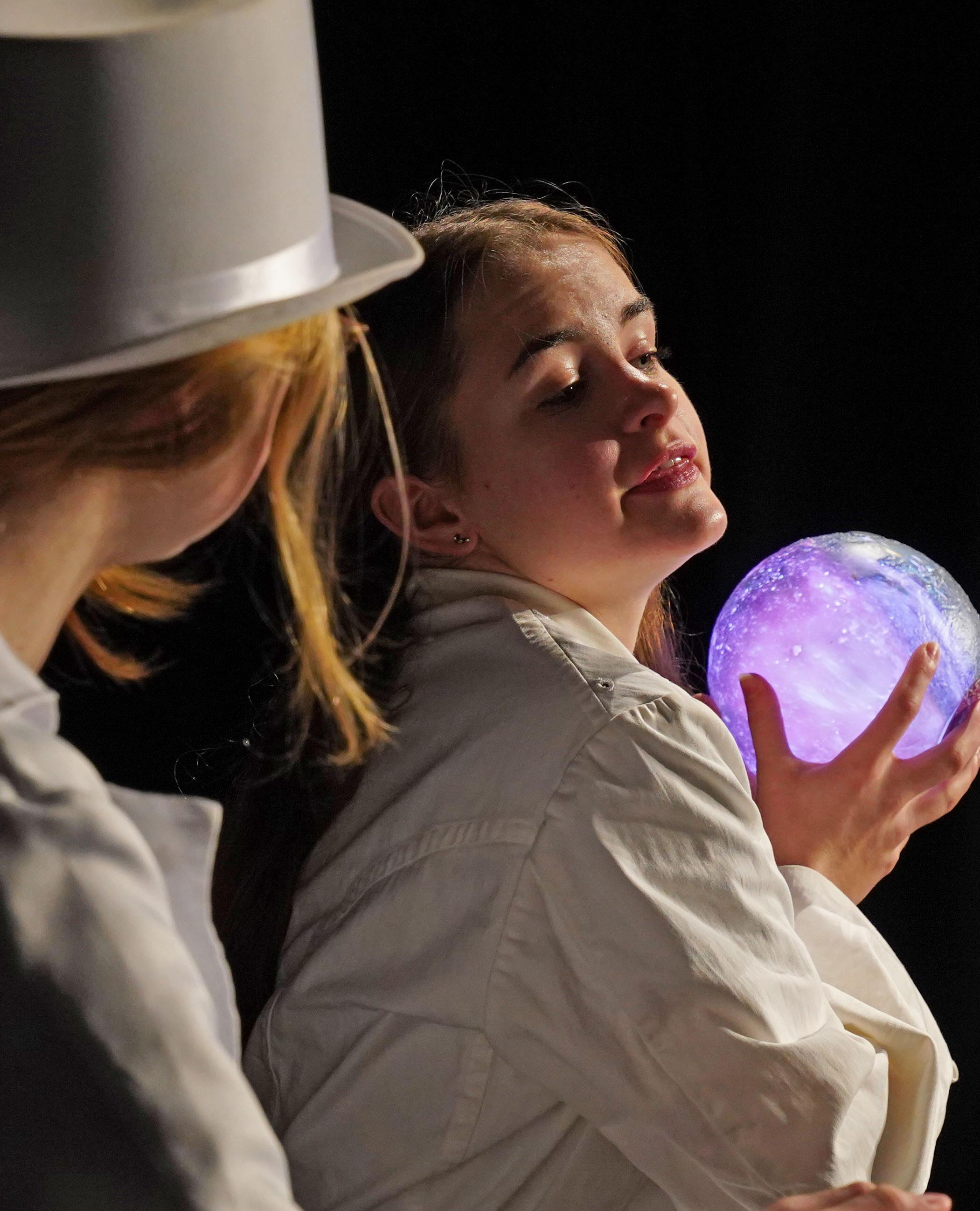
DRAMA
The Drama course is both practical and theory-based. It promotes involvement in and enjoyment of Drama as performers, devisers, directors and designers. Pupils will be introduced to key skills required for GCSE and become proficient in the terminology of theatre both in front of and behind the scenes.
Pupils will be provided with a copy of the script from their Drama teacher.


In Year 9 the girls are introduced to all the three components of the GCSE course and lay the foundation
Devising and creating theatre
Script exploration and performance of extracts of
Understanding and evaluating live theatre
Devising and creating theatre
Pupils will learn devising strategies; creatively approaching a variety of stimuli and developing an actor’s toolbox of skills through Laban culminating in a performance to their peer group at the end of the unit. Alongside this the pupils will keep a portfolio of their ideas and work. Pupils also have access to a super learning platform. Digital Theatre Plus, where they have access to videos of plays, musicals and interviews with actors and directors. This unit of exploration results in them having a portfolio of ideas to draw from in Year 10.
Script exploration and performance of an extract from
Pupils will study and explore a monologue of their own choice. They will be taught the skills of acting and how to approach a script through Stanislavski and perform it to their class off by heart.
• Understanding and evaluating live theatre
Pupils will see live theatre performances out of school as well as inviting actor-practitioners into school to perform for us and share their devising techniques via workshop activities. These we will review and evaluate, which is an important skill to develop for the GCSE examination.
Assessment
The course is assessed via practical presentations, as well as a portfolio of ideas, which is put together like a giant scrapbook and includes write-ups of lessons and evaluations.
Additional Information
Theatre trips, workshops and activities are an essential and exciting part of this course. We go to London, local theatres and invite companies into school. Pupils are encouraged to go to the theatre as much as possible to gain a broad experience. School productions are also an excellent way to gain experience from an actor/technician’s point of view as well as an audience member.
Drama is fun but it also demands a sensitive and considered approach as the success of the group depends upon the concentration and commitment of every individual pupil. Drama will improve pupils’ confidence, motivation, and their ability to work with others under pressure to meet performance deadlines. It will also broaden their understanding of the world around them.
The Year 9 Music course is built around the three key disciplines of Performing, Composing and Listening.
Through these, pupils will develop their understanding of the key musical elements introduced in the Lower School and will refine their skills in preparation for the specific requirements of the GCSE course.
Performing: lessons will include a variety of performance tasks designed to develop confidence in performing individually and as part of an ensemble. Tasks will include vocal, keyboard and instrumental performance and will prepare pupils for the recording of a solo and ensemble piece for the GCSE course. Pupils have the opportunity to showcase their performance skills in musical soirées and other school events.
Composing: pupils will become familiar with the advanced features of GarageBand and Sibelius as they complete a range of composition tasks intended to develop their ability to combine creativity with compositional craft. They
will work in different musical styles in preparation for composing two pieces to submit as GCSE coursework.
Listening: pupils will discover how the key musical elements (melody, harmony, rhythm etc) are combined in various different musical styles, including western classical music, popular music and world music. This will introduce the listening and analytical skills needed for GCSE.
Assessment
By the end of the year, pupils will have recorded at least one performance (solo or ensemble) and completed one extended composition task, which will be formally assessed. They will also complete a short listening examination.
Additional Information
Pupils will be expected to take a full part in co-curricular music-making and to take advantage of the performance opportunities that arise for the various groups. The Year 9 classes will also participate in an external workshop in the course of the year.
sciences
PHYSICAL EDUCATION: HEALTH AND FITNESS
The Physical Education course is both theory and practical-based. Throughout the course, girls will develop their understanding of the key principles of physical activity that promote health and well-being.
In Year 9, girls will be introduced to three components of the GCSE course which will create a solid foundation for the specific requirements of the course in Year 10, as well as give them the knowledge they need to develop their own fitness programmes in the future:
• Theoretical knowledge and understanding of factors that underpin physical activity and sport
• How physiological and psychological states and key socio-cultural influences have an impact on sport
• Ability to analyse and evaluate to improve sporting performance
• Theoretical knowledge
Pupils will learn how to set up and administer a training programme. This will include following a training programme through from start to finish: setting goals according to their own individual needs and requirements for their chosen sporting activity; baseline testing; selecting appropriate methods of training; applying the principles of training; measuring changes in fitness using heart rate and fitness testing as a measure; evaluating and suggesting developments and improvements in their training to gain further fitness improvements.
• Physiological, psychological and socio-cultural influences
Pupils will look at how the body systems work together to enable movement and how different mind states and external influences determine your sporting choices and success.
• Analyse and evaluate
This section will help pupils to develop their confidence as a coach. They will detect skill, tactical and fitness strengths and weaknesses of a performance and suggest strategies to improve performance.
Assessment
Pupils will have written assessments based on the theoretical elements of the course. These will be formed of past GCSE PE examination questions. There will also be opportunities to engage with the GCSE practical assessment criteria, in order to develop pupils’ understanding of the level of performance needed for GCSE PE.
Additional Information
The girls are encouraged to take a full part in co-curricular sport and they will be given the opportunity to be a role model and develop their leadership skills at practices for the younger Year Groups.
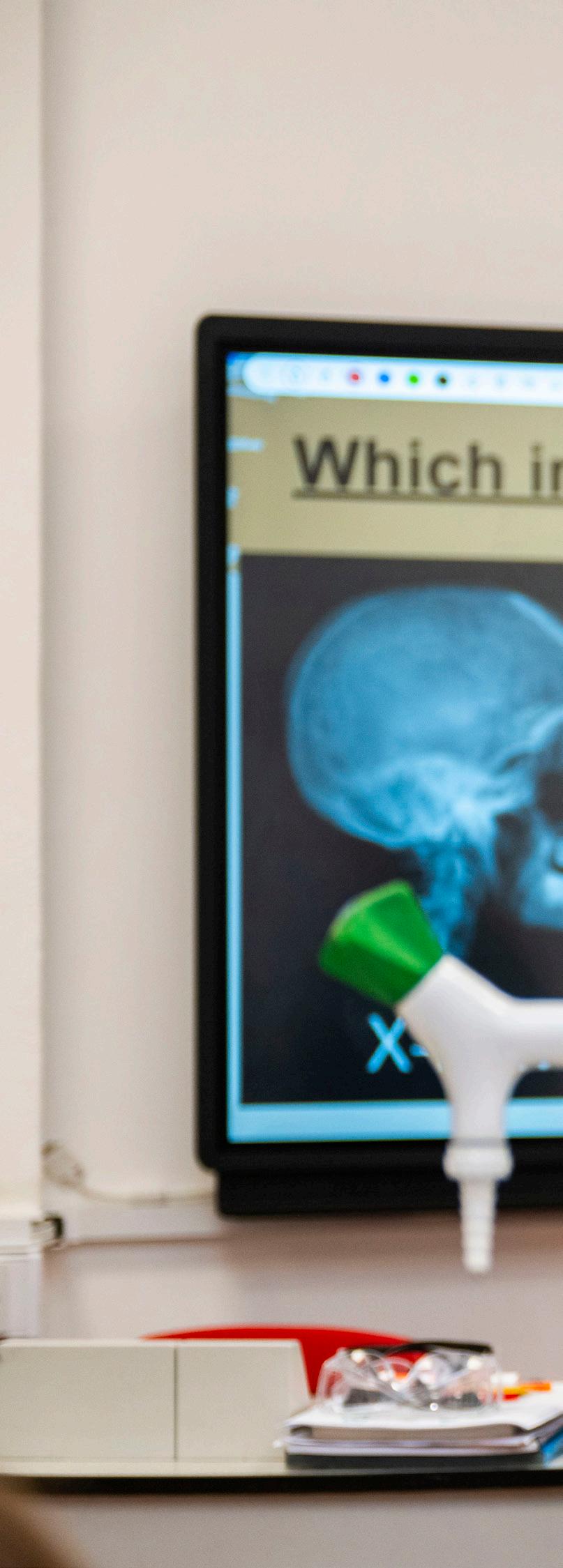
COMPUTING: COMPUTER SCIENCE AND SOFTWARE SKILLS
The Computing course is designed to encompass elements of both academic Computer Science and practical software skills. Some topics contain elements of both, where a topic is studied and a software package used to produce digital content on that topic. Much of the work pupils do in Computing will be in the form of project work, but there will also be some theory lessons.
Pupils will study:
Computer Science
Artificial Intelligence
Software Skills
Spreadsheets
Topics encompassing both Disciplines
Website Design
Computer Programming / Algorithms Working with Video Careers in Technology
Computer Hardware Animation
Binary Numbers
Pico-8 Game Programming
The topics studied provide a solid basis for those who wish to study GCSE Computer Science, in addition to providing valuable software skills, which will be useful to our pupils in both their school work and in later life. The Computer Science topics above feed directly into the GCSE course, providing the girls with an introduction to the theory and an excellent foundation of skills for completing the practical programming element of the course. However, Computing is equally useful for those who do not want to study Computer Science further; it will greatly enhance their understanding of computers and their ability to use software effectively.
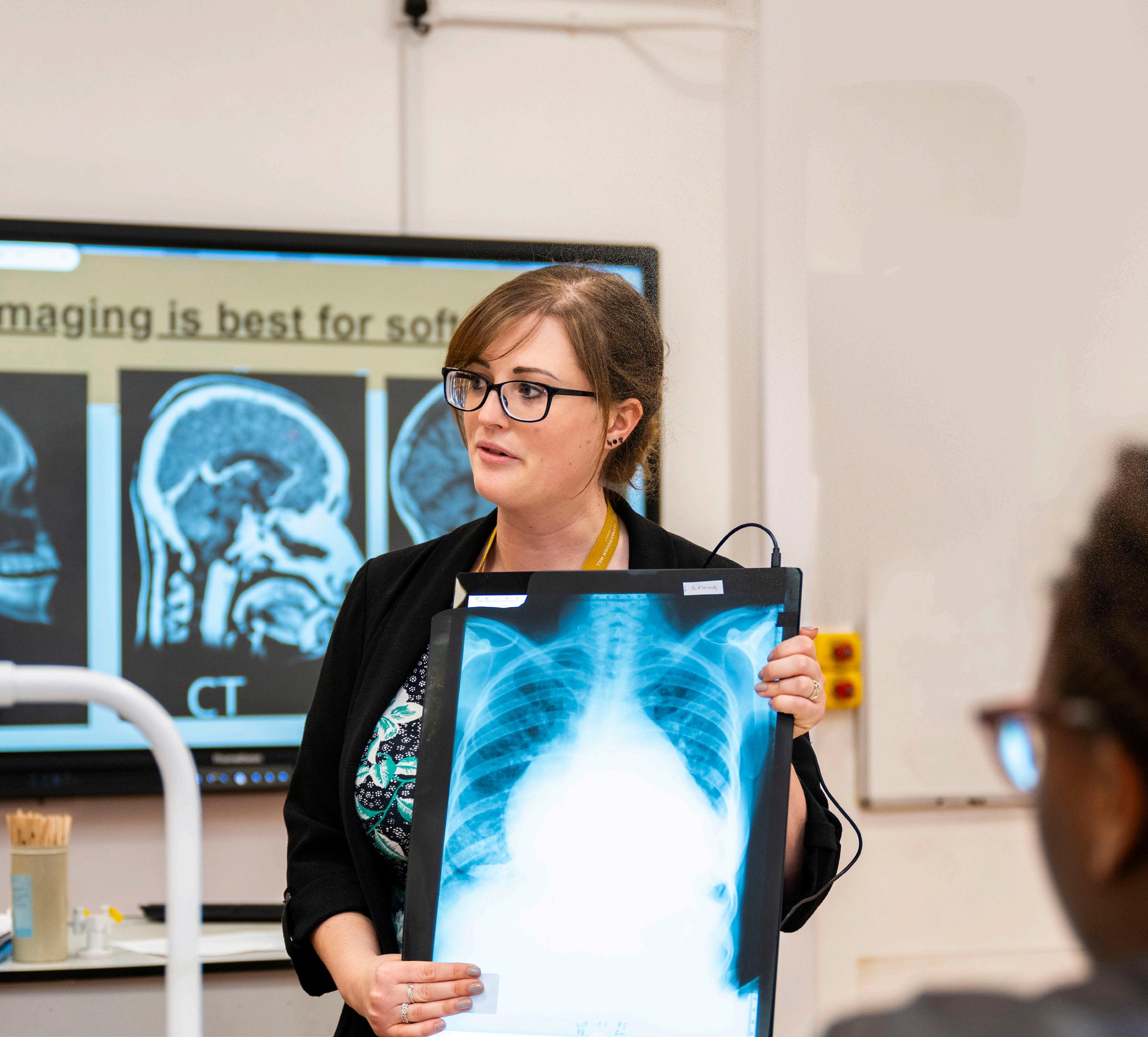
Assessment
Assessment of the course will largely take the form of project work, similar to that completed in Years 7 and 8. However, girls will also be tested on their understanding of the theory elements of the course in the November and Summer Assessments.
be fulfilled
EMPOWER
First introduced in September 2022, Empower is an opportunity for girls in Year 9 to develop a portfolio of skills that will not only enhance their abilities to thrive across the academic curriculum but also allow them to work collaboratively in devising, developing and delivering on an agreed project aim.
Weekly sessions are delivered as part of the academic timetable and are split between workshops led by external experts and opportunities to work collaboratively in developing the project.
The current Year 9 girls are working towards delivering a day of activities centred around STEM, Creative Arts and Sports to local Year 4 pupils. They have benefited from sessions in Project Management, Budgeting and Leadership, and will be provided with training in basic First Aid, Risk Assessment and Teamwork. The activity day takes place in June each year, with over 150 pupils from four local schools taking part.
PROJECT QUALIFICATION
The Project Qualification is an excellent opportunity for girls in Year 9 to explore an area of real interest to them. A topic of their choice is selected and a question developed which the girls will then aim to answer through a journey of research and discovery. Topics are wideranging every year, with girls looking into extensions of the curriculum studied in lessons, a hobby they are passionate about, or perhaps something completely new to them.
Taught sessions are delivered in Form Time slots across the Autumn and Spring Terms and led by a variety of staff. Each girl will also have a Supervisor to guide and support their Project. Girls will have an hour of dedicated time in the Library once every two weeks between October and February to work on their Projects and meet with their Supervisors.
A Presentation Evening is held in February or March and provides the opportunity for pupils to deliver their research journey and findings to a friendly audience made up of Supervisors, family and friends. The presentation, written report and research log are then submitted for marking.
The Project Qualification is an excellent opportunity to foster a love of learning and hone a variety of transferable skills through researching a topic of choice that the pupil is personally invested and interested in.

